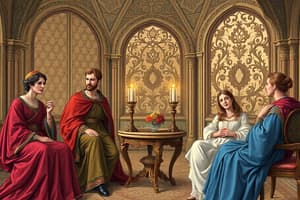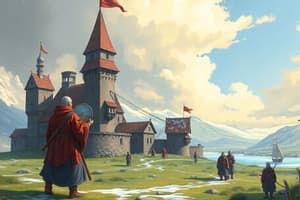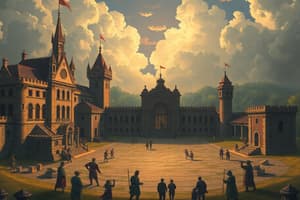Podcast
Questions and Answers
How did Scholasticism influence medieval political thought?
How did Scholasticism influence medieval political thought?
Scholasticism emphasized the use of reason and logic to understand religious doctrines, which in turn shaped the political concepts of the time.
Explain the concept of natural law in medieval political thought.
Explain the concept of natural law in medieval political thought.
Natural law posits that certain laws are inherent in human nature and discoverable through reason, aligning human laws with divine will.
What role did theocracy play in medieval governance?
What role did theocracy play in medieval governance?
Theocracy established a political framework where religious authority held significant power, influencing political decisions and structures.
Describe the conflict between the Church and State during the medieval period.
Describe the conflict between the Church and State during the medieval period.
What were the primary influences of Christianity on medieval political thought?
What were the primary influences of Christianity on medieval political thought?
How did natural law justify political actions in medieval society?
How did natural law justify political actions in medieval society?
In what ways did Scholasticism reconcile faith with reason?
In what ways did Scholasticism reconcile faith with reason?
What was the significance of the relationship between the Church and State?
What was the significance of the relationship between the Church and State?
Flashcards
Medieval Political Thought
Medieval Political Thought
Medieval political thought was deeply influenced by religion, particularly Christianity, focusing on the relationship between spiritual and temporal power.
Scholasticism
Scholasticism
A medieval method of philosophical inquiry emphasizing reasoned argument and dialectic, often using classical sources to understand religious doctrines.
Natural Law
Natural Law
Inherent laws discoverable through reason, believed to be rooted in God's plan for a just world, acting as a standard for judging human laws.
Theocracy
Theocracy
Signup and view all the flashcards
Church-State Relations
Church-State Relations
Signup and view all the flashcards
Faith's influence
Faith's influence
Signup and view all the flashcards
Natural law principle
Natural law principle
Signup and view all the flashcards
Scholastic method
Scholastic method
Signup and view all the flashcards
Study Notes
Main Features of Medieval Political Thought
- Medieval political thought was deeply influenced by religious doctrines, particularly Christianity.
- It focused on establishing a harmonious relationship between the spiritual and the temporal realms.
- A key concern was the proper role of the Church and the State, often seen as interwoven institutions.
- The concept of natural law, derived from divine reason, played a significant role in shaping political concepts.
Scholasticism
- Scholasticism was a prominent method of philosophical inquiry during the Middle Ages. It emphasized reasoned argument and dialectic, largely drawing from classical sources.
- Applying logic and reason to understand religious doctrines was central to Scholastic thought.
- Scholasticism, exemplified by Thomas Aquinas, sought to reconcile faith and reason, integrating Aristotelian philosophy within the Christian framework.
- This approach to applying logic and reason to religious understanding had a strong impact on how political concepts were explored.
Natural Law
- Natural law, deeply rooted in faith, postulates that certain laws are inherent in human nature and discoverable through reason.
- This concept, derived from the belief that God created the world with inherent order, suggested laws aligning with divine will.
- Natural law theory played a critical role in justifying and assessing political actions.
- Natural law was believed to be an objective, immutable standard against which human laws could be judged.
Theocracy
- The concept of theocracy, where religious authority holds significant political power, was an important consideration in medieval political thought.
- The Church often wielded considerable influence, affecting political decisions and structures.
- This blend of religious and political authority was central to medieval governance.
- The relationship between the secular and religious authorities was often complex and contested.
Church and State Relations
- The interplay between the Church and State was a central theme in medieval political thought. Both were vying for power and influence.
- The debate around the proper authority of each institution was a constant source of tension.
- Issues such as papal authority and the rights of the monarch often created conflict.
- Questions regarding the limits of the Church's influence on temporal affairs were frequent.
- Different eras saw different intensities of confrontation and attempts at cooperation.
Feudalism
- Feudalism, a hierarchical social, political, and economic system, shaped medieval political structures.
- It operated on a system of reciprocal obligations between lords and vassals, influencing loyalty and political power.
- The structures of feudalism influenced the understanding of political authority and power distribution.
- The relationships established in feudal systems impacted the power available in the political landscape.
- The decentralized nature of feudal power often created complexities in governance.
Studying That Suits You
Use AI to generate personalized quizzes and flashcards to suit your learning preferences.




